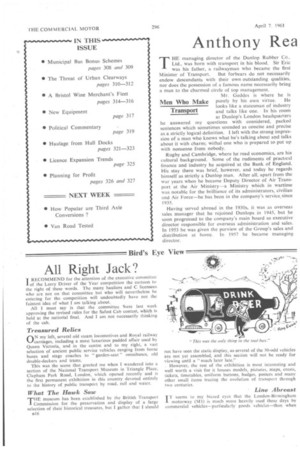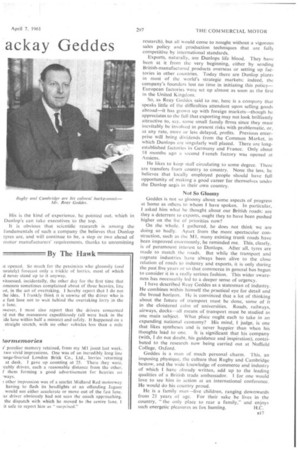Anthony Rea ackay Geddes
Page 50

Page 51

If you've noticed an error in this article please click here to report it so we can fix it.
THE managing director of the Dunlop Rubber CO.. Ltd., was born with transport in his blood. Sir Eric was his father, a railwayman who became the first
Minister of Transport. But forbears do not necessarily endow descendants with their own outstanding qualities, nor does the possession of a famous name necessarily bring a man to the charmed circle of top management.
Mr. Geddes is where he is purely by his own virtue. He looks like a statesman of industry and talks like one. In his room at Dunlop's London headquarters he answered my questions with considered, packed sentences which sometimes sounded as concise and precise as a strictly logical definition. I left with the strong impression of a man who knows what he's talking about and talks about it with charm; withal one who is prepared to put up with nonsense from nobody.
Rugby and Cambridge, where he read economics, are his cultural background. Some of the rudiments of practical finance and industry he acquired at the Bank of England. His stay there was brief, however, and today he regards himself as strictly a Dunlop man. After all; apart from the war years when he became Deputy Director of Air Transport at the Air Ministry—a Ministry which in wartime was notable for the brilliance of its administrators, civilian and Air Force—he has been in the company's service.since
1935. .
Men Who Make Transport
Having served abroad in the 1930s, it was as overseas sales manager that he rejoined Dunlops in 1945, but he soon progressed to the company's main board as executive director responsible for overseas administration and sales. In 1953 he was given the purview of the Group's sales and distribution at home. In 1957 he became managing director. His is the kind of experience, he pointed out, which in Dunlop's can take executives to the top.
It is obvious that scientific research is among the fundamentals of such a company (he believes that Dunlop tyres are, and will continue to be, a step or two ahead of motor manufacturers' requirements. thanks to unremitting
research), but all would come to nought without a vigorous sales policy and production techniques that are fully competitive by international standards.
Exports, naturally, are Dunlops life blood. They have been at it from the very beginning, either by sending British-manufactured products overseas or setting up factories in other countries. Today there are Dunlop plants in most of the world's strategic markets; indeed, the company's founders lost no time in initiating this policy— European factories were set up almost as soon as the first in the United Kingdom.
So, as Reay Cieddes said to me, here is a company that speaks little of the difficulties attendant upon selling goods abroad—it has grown up with foreign markets—though he appreciates to the full that exporting may not look brilliantly attractive to, say, some small family firms since they must inevitably be involved in present risks with problematic, or, at any rate, more or less delayed, profits. Previous enterprise will bring dividends from the Common Market, in which Dunlops are singularly well placed. There are longestablished factories in Germany and France. Only about 18 months ago a second French factory was opened at Amiens.
He likes to keep staff circulating to some degree. There are transfers from country to country. None the less, he believes that locally employed people should have full opportunity of making a good career for themselves under the Dunlop aegis in their own country.
Not So Gloomy
Geddes is not so gloomy about some aspects of progress at home as others to whom I have spoken. In particular, 1 asked him what he thought about our British roads: are they a deterrent to exports, ought they to have been pushed higher on the list of priorities now?
On the whole. I gathered, he does not think we are doing so badly. Apart from the more spectacular construction, such as thu Ml, many existing trunk roads have been improved enormously, he reminded me, This, clearly, is of paramount interest to Dunlops. After all, tyres are made to match the roads, But while the transport and cognate industries have always been alive to the close relation of roads to industry and exports, it is only during the past five years or so that commerce in general has begun to consider it in a really serious fashion. This wider awareness has necessarily led to a deeper sense of urgency.
I have described Reay Geddes as a statesman of industry. He combines within himself the practical eye for detail and the broad horizon. He is convinced that a lot of thinking about the future of transport must be done, some of it in the cloistered calm of universities. Roads, railways, airways, docks—all means of transport must be studied as one main subject. What place ought each to take in an expanding national economy? His mind, I judge, is one that likes syntheses and is never happier than when his thoughts lead to one. it is significant that his 'company (with, I do not doubt, his guidance and inspiration), contributed to the research now being carried out at Nuffield College, Oxford.
Geddes is a man of much personal charm. This, an imposing physique, the culture that Rugby and Cambridge bestow, and the wide knowledge of commerce and industry of which I have already written, add up to the leading qualities of a British trade ambassador. I for one would love to see him in action at an international conference. He would do his country proud.
He is a family man --five children, ranging downwards from 21 years of age. For their sake he lives in the country, "the only place to rear a family," and enjoys such energetic pleasures as fox hunting. H.C.




























































































































































